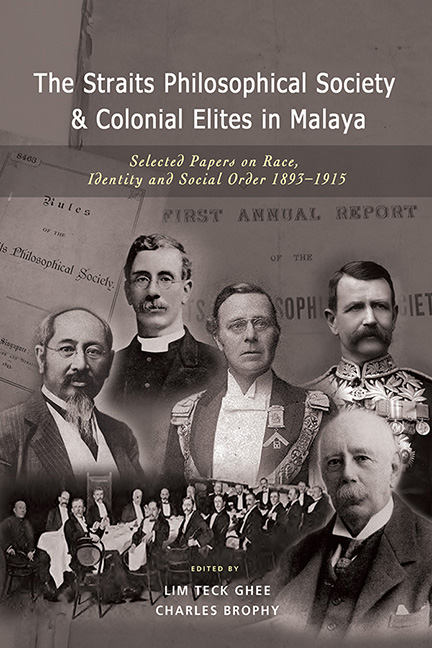 The Straits Philosophical Society and Colonial Elites in Malaya
The Straits Philosophical Society and Colonial Elites in Malaya Published online by Cambridge University Press: 09 January 2024
Editors’ Note
As with the sex trade, the opium trade was another contested area of British policy in the Straits and one which was the object of discussion in the Society in 1893 on an evening in which two papers on the topic were presented. At this time the colonial policy of revenue farming was coming under pressure from moral reformers and Liberal politicians in Britain and by 1893, a Commission was appointed by Gladstone to investigate whether the trade should be suppressed across the Empire. In 1893 the Secretary of the Anti-Opium Society would arrive in the Straits to study the situation in the colony, whilst there was also emerging a growing anti-opium movement led by missionaries such as Rev. W.G. Shellabear, Rev. A. Lamont, Rev. J.A.B. Cook and Straits Chinese thinkers like Lim Boon Keng and Tan Teck Soon. As with Galloway’s essay, a dominant theme in Reith’s essay was how, in the face of liberal criticisms, an exception could be made for the colony, and the opium trade justified. In doing so Reith would follow arguments not dissimilar to those made by Galloway. An exception was firstly justified because the scale of the use of opium in the colony made demand difficult to eradicate. Secondly, suppression of production in British India would only drive traders in the colony to source opium from China, sending the trade underground, increasing smuggling, and harming the tax revenue of the colony. Finally, he argued that suppression of the trade would worsen relations between the Chinese and Europeans, citing recent disturbances in Kulim as proof. In this way Reith resurrected the spectre of the violent and difficult to govern Chinese to justify the continued trade in opium.
Though the object of a Philosophical Society is to dig about the roots of things, to question fact or imagination about the causes of things, and to weave theories about the moral bearing of things, yet the Straits Philosophical Society can hardly discuss the much discussed question about the opium traffic, without having much to say about the opium problem as it presents itself to this colony.
To save this book to your Kindle, first ensure [email protected] is added to your Approved Personal Document E-mail List under your Personal Document Settings on the Manage Your Content and Devices page of your Amazon account. Then enter the ‘name’ part of your Kindle email address below. Find out more about saving to your Kindle.
Note you can select to save to either the @free.kindle.com or @kindle.com variations. ‘@free.kindle.com’ emails are free but can only be saved to your device when it is connected to wi-fi. ‘@kindle.com’ emails can be delivered even when you are not connected to wi-fi, but note that service fees apply.
Find out more about the Kindle Personal Document Service.
To save content items to your account, please confirm that you agree to abide by our usage policies. If this is the first time you use this feature, you will be asked to authorise Cambridge Core to connect with your account. Find out more about saving content to Dropbox.
To save content items to your account, please confirm that you agree to abide by our usage policies. If this is the first time you use this feature, you will be asked to authorise Cambridge Core to connect with your account. Find out more about saving content to Google Drive.